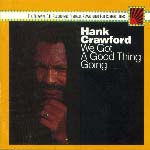|
Kudu - Page 1 > 2 > 3 > 4 > 5 Kudu, an African mammal with long spiked horns, connoted Black pride in an era that was very politicized by such things. Even the logo for Creed Taylor's first subsidiary label used Afro-centric colors to signal its mission, which Taylor described as "a black awareness label, more commercial oriented than CTI and indigenous to the black popular music of the United States." None of Kudu's recordings, however, were especially political (like the Bob Thiele productions of the time at Flying Dutchman). Kudu, launched by Creed Taylor in July 1971, specialized in the "soul jazz" those labels like Prestige and Atlantic had long ago mastered and a style, though lacking critical respect, had usually found significant popular success. Indeed, Kudu inherited its roster from the houses that built the Prestige and Atlantic soul-jazz market. The music heard on Kudu was never really intended to have high ideals or aspire to greater purposes. The point was the groove. If people couldn't dance to it, then it belonged somewhere else. Correspondingly, the Kudu records never looked as impressive as the records from parent company, CTI, did. All issues (except for the two double-disc Grover Washington, Jr. sets) were issued in single-pocket sleeves, and most featured little more than a head shot of the artist with the artist's name and the album's title. But Kudu was an especially successful label - and it started with an accident of fate. One of Kudu's first sessions was intended to serve as Hank Crawford's first non-Atlantic recording. When the great alto player was unable to make the date, Creed Taylor gave tenor saxophonist Grover Washington, Jr. his shot at solo stardom. Inner City Blues was the result and it proved to be a huge soul-jazz success. Each one of Washington's successive albums, guided by Bob James's deft arrangements, continued to gain in popularity until 1975, when Feels So Good and Mister Magic reigned the charts. Indeed, it was Washington's popularity that helped Creed Taylor end the distribution relationship he formed with Motown Records in 1974. When Taylor sought independence from Motown in 1977, he had to sacrifice Grover Washington, Jr. and the saxophonist's entire Kudu catalog to the Detroit-based soul label (even though Washington made only two records for Motown before departing for even bigger success at Elektra records in 1980). The Kudu label elicited some of the CTI family's finest music: Soul Box, Higher Ground, Power Of Soul and Tico Rico in particular as well as consistently fine performances from Esther Phillips, Hank Crawford and Johnny Hammond. The Kudu label more or less fizzled out by 1978 and Creed Taylor has tried reviving the imprint several times since: once in 1983, with an aborted "sideman" project yielding only one title from Grover Washington, Jr. and in the 1990s for two CDs (Music From & Inspired By The Film The Devil's Toothpick and Evolution). |
||
| 1971 |
 |
Breakout Johnny Hammond Issues: Kudu KU-01 Master No.: RVG 98761 A/B |
 |
Mama Wailer Lonnie Smith Issues: Kudu KU-02 Master No.: RVG 98762 A/B |
|
 |
Inner City Blues Grover Washington, Jr. Issues: Kudu KU-03 Master No.: RVG 98763 A/B |
|
| 1972 |
 |
Wild Horses Rock Steady Johnny Hammond Issues: Kudu KU-04 Master No.: RVG 98764 A/B |
 |
From A Whisper To A Scream Esther Phillips Issues: Kudu KU-05 Master No.: RVG 98765 A/B |
|
 |
Help Me Make It Through The Night Hank Crawford Issues: Kudu KU-06 Master No.: RVG 98766 A/B |
|
  |
All The King’s Horses Grover Washington, Jr. Issues: Kudu KU-07 Master No.: RVG 98767 RE A/B |
|
 |
We Got A Good Thing Going Hank Crawford Issues: Kudu KU-08 Master No.: RVG 98768 A/B |
|
| 1973 |
 |
Alone Again, Naturally Esther Phillips Issues: Kudu KU-09 Master No.: RVG 98769 A/B |
 |
The Prophet Johnny Hammond Issues: Kudu KU-10 Master No.: RVG 98770 A/B |
|
| Kudu - Page 1 > 2 > 3 > 4 > 5 | ||